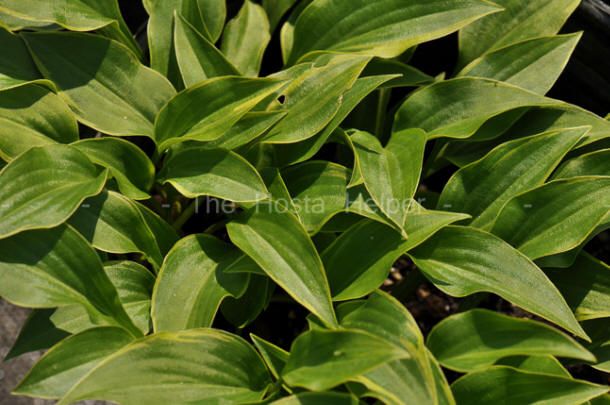|
 Jointly registered in 1995 by
Mark Zilis of Illinois and
Wm Zumbar of Ohio, this
H. pulchella type
cultivar grows into a small size hosta about 6 inches in height and 15 inches in width. The
leaves have a narrow yellow marginal variegation and are ovate shaped, wavy and shiny with smooth texture.
Reddish purple flowers bloom in August followed by viable seeds. Jointly registered in 1995 by
Mark Zilis of Illinois and
Wm Zumbar of Ohio, this
H. pulchella type
cultivar grows into a small size hosta about 6 inches in height and 15 inches in width. The
leaves have a narrow yellow marginal variegation and are ovate shaped, wavy and shiny with smooth texture.
Reddish purple flowers bloom in August followed by viable seeds.

According to
The Hostapedia by Mark Zilis (2009), "I received this
Japanese plant as
'Hogon Hime'. That name was incorrect since its translation,
"gold dwarf", is not at all descriptive of the plant. With my
approval, Bill Zumbar named it 'Gaijin'."
The Book of Little Hostas by Kathy and Michael Shadrack
(2010) says: "Best in dappled shade but a good edging plant for a
border or pathway."
The New Encyclopedia of Hostas by
Diana
Grenfell (2009) states in its Miniature Hostas chapter: "...suitable for
a dedicated border for the smallest hostas although it will soon
outstrip most others and will need regular division to keep in
check. Robust and a moderate increaser. Also holds its own at
the front of a raised bed. Currently having a resurgence in
popularity...The flowers are widely spaced down the scape. There
can be a repeat bloom in late autumn."
 
In answer to a question about growing smaller hostas that appeared in
The
Hosta Journal (2012 Vol. 43 No. 2), Sandie
Markland of North Carolina commented, "There two smaller hostas that really
stand out among the many I have grown over the years: H. 'Gay Blade' and the
truly diminutive, 'Gaijin'...I have grown both of these beauties for the past 15
years and still have the original plants I purchased as a budding collector in
1997. I think that really says something about the plant!"
An article by Warren I. Pollock in
The
Hosta Journal (2015 Vol. 46 No.1) states that, "In
2013, Randy Goodwin...registered H. 'Moolah'. A seedling of H. 'Gaijin' ×
unknown, it is little with leaves about 3½ inches long by 2½ inches wide and
mound size about 5 inches high by 12 inches across. The dark green foliage is
leathery, cupped and corrugated, with greenish yellow margin that brightens to
cream as the season progresses." The article goes on to say that this plant has
been mistakenly offered in the trade under the name H. 'Mulah'.






 |



